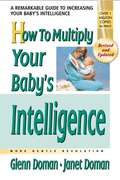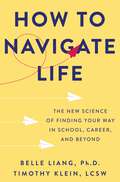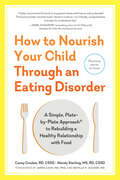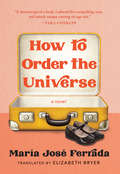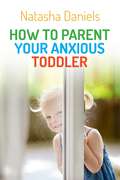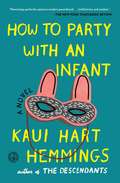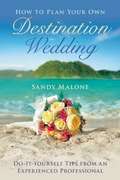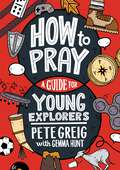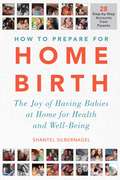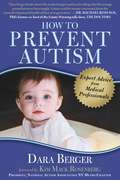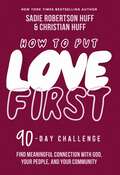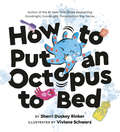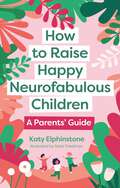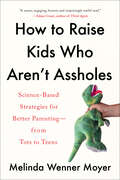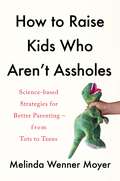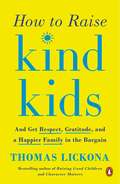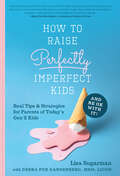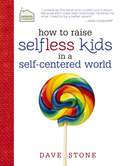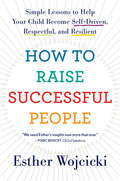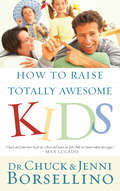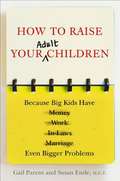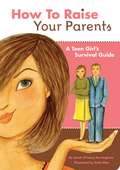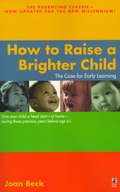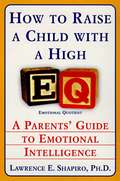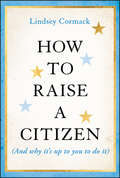- Table View
- List View
How to Multiply Your Baby's Intelligence
by Glenn Doman Janet DomanTime and again, the work performed at The Institutes for the Achievement of Human Potential has demonstrated that children from birth to age six are capable of learning better and faster than older children. How To Teach Your Baby To Read shows just how easy it is to teach a young child to read, while How To Teach Your Baby Math presents the simple steps for teaching mathematics through the development of thinking and reasoning skills. Both books explain how to begin and expand each program, how to make and organize necessary materials, and how to more fully develop your child&’s reading and math potential. How to Give Your Baby Encyclopedic Knowledge shows how simple it is to develop a program that cultivates a young child&’s awareness and understanding of the arts, science, and nature—to recognize the insects in the garden, to learn about the countries of the world, to discover the beauty of a Van Gogh painting, and much more. How To Multiply Your Baby&’s Intelligence provides a comprehensive program for teaching your young child how to read, to understand mathematics, and to literally multiply his or her overall learning potential in preparation for a lifetime of success.The Gentle Revolution Series:The Institutes for the Achievement of Human Potential has been successfully serving children and teaching parents for five decades. Its goal has been to significantly improve the intellectual, physical, and social development of all children. The groundbreaking methods and techniques of The Institutes have set the standards in early childhood education. As a result, the books written by Glenn Doman, founder of this organization, have become the all-time best-selling parenting series in the United States and the world.
How to Navigate Life: The New Science of Finding Your Way in School, Career, and Beyond
by Belle Liang PhD Timothy Klein LCSWAn essential guide to tackling what students, families, and educators can do now to cut through stress and performance pressure, and find a path to purpose.Today’s college-bound kids are stressed, anxious, and navigating demands in their lives unimaginable to a previous generation. They’re performance machines, hitting the benchmarks they’re “supposed” to in order to reach the next tier of a relentless ladder. Then, their mental and physical exhaustion carries over right into first jobs. What have traditionally been considered the best years of life have become the beaten-down years of life. Belle Liang and Timothy Klein devote their careers both to counseling individual students and to cutting through the daily pressures to show a better way, a framework, and set of questions to find kids’ “true north”: what really turns them on in life, and how to harness the core qualities that reveal, allowing them to choose a course of study, a college, and a career. Even the gentlest parents and teachers tend to play into pervasive societal pressure for students to PERFORM. And when we take the foot off the gas, we beg the kids to just figure out what their PASSION is. Neither is a recipe for mental or physical health, or, ironically, for performance or passion. How to Navigate Life shows that successful human beings instead tap into their PURPOSE—the why behind the what and how. Best of all, purpose is a completely translatable quality to every aspect of life, from first jobs to last jobs and everything in between.
How to Nourish Your Child Through an Eating Disorder: A Simple, Plate-by-plate Approach® To Rebuilding A Healthy Relationship With Food
by Wendy Sterling Casey CrosbieA revolutionary, entirely visual approach to helping your child overcome their eating disorder (ED) and eat normally again that does away with counting calories and measuring food—rooted in the leading evidence-based approach: Family-Based Therapy (FBT) Parents are the first to know when their child starts behaving differently. Has your son stopped eating his favorite food, or does he refuse to eat out with friends? Has your daughter drastically increased her exercise regimen, or become obsessed with health foods? These are among the telltale signs that your child, like millions of others, may have an eating disorder (ED). In this essential guide, registered dietitians Casey Crosbie and Wendy Sterling introduce an all-new strategy you can use to help your child at home. The Plate-by-Plate approach is rooted in family-based treatment (FBT)—the leading psychological therapy for EDs. Unlike complicated “exchange” systems, this is simple: Crosbie and Sterling coach you through every aspect of meeting your child’s nutritional needs, using just one tool—a ten-inch plate. Paired with therapy, this intuitive, visual method is the best way to support your child on the path to recovery. Plus, the authors cover how to talk about diet and weight, what to do while traveling, what to expect from your child’s doctor, and much more.
How to Order the Universe
by María José Ferrada“A dreamscape of a book. I adored this compelling, wise, and utterly unique coming-of-age tale.” —Tara Conklin For seven-year-old M, the world is guided by a firm set of principles, based on her father D’s life as a traveling salesman. Enchanted by her father’s trade, M convinces him to take her along on his routes, selling hardware supplies against the backdrop of Pinochet-era Chile. As father and daughter trek from town to town in their old Renault, M’s memories and thoughts become tied to a language of rural commerce, philosophy, the cosmos, hardware products, and ghosts. M, in her innocence, barely notices the rising tensions and precarious nature of their work until she and her father connect with an enigmatic photographer, E, whose presence threatens to upend the unusual life they’ve created. María José Ferrada expertly captures a vanishing way of life and a father-daughter relationship on the brink of irreversible change. At once nostalgic, dangerous, sharply funny, and full of delight and wonder, How to Order the Universe is a richly imaginative debut and a rare work of magic and originality.
How to Parent Your Anxious Toddler
by Natasha DanielsWhy does your toddler get upset when his or her routine is disrupted? Why do they follow you from room to room and refuse to play on their own? Why are daily routines such as mealtimes, bath time, and bed time such a struggle? This accessible guide demystifies the difficult behaviors of anxious toddlers, offering tried-and-tested practical solutions to common parenting dilemmas. Each chapter begins with a real life example, clearly illustrating the behavior from the parent's and the toddler's perspective. Once the toddler's anxious behavior has been demystified and explained, new and effective parenting approaches are introduced to help parents tackle everyday difficulties and build up their child's resilience, independence, and coping mechanisms. Common difficulties with bath time, toileting, sleep, eating, transitions, social anxiety, separation anxiety, and sensory issues are solved, along with specific fears and phobias, and more extreme behaviors such as skin picking and hair pulling. A must-read for all parents of anxious toddlers, as well as for the professionals involved in supporting them.
How to Party With an Infant: A Novel
by Kaui Hart Hemmings“Mommyhood gets hilariously tricky in this novel from the author of The Descendents” (Cosmopolitan). How to Party With an Infant follows a quirky single mom who finds friendship and love in this “smart, funny send-up of modern motherhood, San Francisco-style” (San Francisco Chronicle).When Mele Bart told her boyfriend Bobby she was pregnant with his child, he stunned her with an announcement of his own: he was engaged to someone else. Fast forward two years, Mele’s daughter Ellie is a toddler, and Bobby and his fiancée want Ellie to be the flower girl at their wedding. Mele, who also has agreed to attend the nuptials, knows she can’t continue obsessing about Bobby and his cheese making, Napa-residing, fiancée. She needs something to do. So she answers a questionnaire provided by the San Francisco Mommy Club in elaborate and shocking detail and decides to enter their cookbook writing contest. Even though she joined the group out of desperation, Mele has found her people: Annie, Barrett, Georgia, and Henry (a stay-at-home dad). As the wedding date approaches, Mele uses her friends’ stories to inspire recipes and find comfort, both. The “delicious” (The Seattle Times) How to Party with an Infant is a hilarious and poignant novel from Kaui Hart Hemmings, who has an uncanny ability to make disastrous romances and tragic circumstances not only relatable and funny, but unforgettable. “[Hemmings] perfectly captures modern parenthood among the privileged and, with moments of concise poignancy, the silent shames of motherhood...The pleasure of Hemmings’s levity and wisdom more than sustain the reader. We cheer for her warm, self-deprecating characters and hope they continue to laugh together instead of crying alone” (The New York Times Book Review).
How to Plan Your Own Destination Wedding: Do-It-Yourself Tips from an Experienced Professional
by Sandy MaloneTen years ago, when Sandy Malone was planning her Caribbean destination wedding, there was no Pinterest, no Instagram, and no Wedding Wire. The Knot and the Wedding Channel were in their infancy. And Malone was planning her wedding from scratch.The tips and advice in How to Plan Your Own Destination Wedding will help brides and grooms navigate the murky waters of destination-wedding planning—and they are murky because most do-it-yourself brides and grooms are looking to do something “different” from what all of their friends have done before them. Unfortunately, the more remote, bizarre, and challenging the destination is, the more attractive it appears to the do-it-yourself couple.That’s where Sandy Malone, star of Wedding Island (TLC), who has been planning weddings for ten years, comes in. She offers advice to brides and grooms on how NOT to spend money on things they don’t need to invest in, and where they DO need to spend money to make sure the event runs smoothly. She also gives tips on how to negotiate the contract with the venue, the “wetiquette” of invitations for destination weddings, finding and handling vendors abroad, and much more. This book offers the complete guide to destination weddings, by a true expert!
How to Pray: A Guide for Young Explorers
by Pete Greig Gemma HuntInspired by the hugely successful How to Pray. Pete Greig takes his simple guide to prayer and gives children the same tools and encouragement. How to Pray: A Guide for Young Explorers is packed full of real life stories, teaching, fun facts, activities and inspiration to get creative and confident in prayer. With insights and ideas from CBBC presenter and author Gemma Hunt, children's workers and children from around the country, this is the go-to guide for prayer for a new generation.
How to Prepare for Home Birth: The Joy of Having Babies at Home for Health and Well-Being
by Shantel SilbernagelFor First-, Second-, or Third-Time Moms, Single Parents, Same-Sex Parents, and More—This Isn&’t Your Typical &“Birth Story&” Book! With an exciting collection of personal narratives, How to Prepare for Home Birth sheds light on the varied and fascinating experiences of women choosing home birth. Anyone even remotely interested in home birth will want to pull up a chair and witness one of the most intimate moments in each family&’s life. From the redwoods of California to a converted cowshed in Ireland, readers will be not only entertained, but also exposed to what home birth really feels, looks, and sounds like. Topics include:First-time home birthHome birth after hospital birthHome birth after Cesarean sectionPostpartum adviceAnd so much moreExpectant parents will come away with a deep understanding and sense of security, knowing that if others have done this, they can, too.
How to Prevent Autism: Expert Advice from Medical Professionals
by Scott Smith Katie Wright James Lyons-Weiler Kim Mack Rosenberg Dara Berger Dr Sidney Baker Dr Nancy O'Hara Geri Brewster Maureen McDonnel Dr Anju Usman Dr Stephanie Seneff Maria Rickert-Hong Corinne Simpson BrownThe statistics are alarming and become more so every year. The Centers for Disease Control and Prevention estimates that 1 in 68 children have been identified with an autism spectrum disorder, making it one of the fastest growing developmental disorders in the United States. Further, the CDC estimates that parents with a child on the autism spectrum can have nearly a 20 percent chance of having a second child with autism.In How to Prevent Autism, Dara Berger shares her personal journey with autism. She describes everything that went wrong with her son that led to an autism diagnosis and everything she did differently to prevent her daughter from suffering the same fate. She interviews eight well-known ASD experts--including doctors, nutritionists, nurses, and scientists--about the factors that have led to the growing epidemic of autism. Based on the best practices for preventing autism in children, each professional offers perspectives grounded in their own research and their patients’ improvements. The book covers every detail--from the importance of mothers’ cleaning out their bodies preconception, through common genetic mutations that may put children at risk, to the crucial role of nutrition in prevention.All parents agree that every choice counts when it comes to the health of their children. As Dara Berger makes clear in this personal, informative, and authoritative book, the stakes could not be higher when it comes to autism.
How to Put Love First: Find Meaningful Connection with God, Your People, and Your Community (A 90-Day Challenge) - 90 Daily Devotions
by Sadie Robertson Huff Christian HuffDiscover the joy and freedom of being loved and loving well.Do you feel your relationships are lacking deep connections? Do you feel your time with God could be more rewarding? New York Times bestselling author Sadie Robertson Huff and her husband, Christian, invite you on a 90-day journey to embrace a life-giving relationship with God and experience authentic, healthy relationships with your people and your community.You are meant to be in relationships that bring joy and connection—that help you know soul-deep peace and leave you feeling loved instead of lonely. Instead, surface-level friendships, filtered social media feeds, unresolved conflicts, and unhealthy relationships can often seem to harm our self-worth, spiritual growth, and mental health—and keep us from the very relationships that could bring that true connection.How to Put Love First reminds you that prioritizing and deepening your love relationship with God is the key to growing healthy relationships in every area of life. Through personal stories of their own walks with God, their pitfalls and victories in relationships of all kinds, and biblical encouragement, Sadie and Christian will help you:Find peace and connection in your relationship with GodEnjoy healthier, happier relationships with close friends and familyLearn how to resolve conflict, offer forgiveness, and endure lonelinessReap the mental and spiritual health benefits of thriving in community As an added bonus, Dr. Josh Kirby, a psychologist and life coach, joins Sadie and Christian to speak into some of the key themes in the book to offer informed, practical counsel to further help you incorporate these important teachings into your life.If your relationships feel more frustrating than life-giving or if you feel like something deeply important is missing in your life, join Sadie and Christian on this 90-day challenge to discover the joy and freedom of being loved and loving well.Look for additional inspirational books, devotionals, and Bible studies from Sadie:Who Are You Following?Who Are You Following? Guided JournalWho Are You Following? Bible Study Guide plus Streaming VideoLive On PurposeLiveLive Fearless
How to Put an Octopus to Bed: (going To Bed Book, Read-aloud Bedtime Book For Kids)
by Sherri Duskey RinkerA new bedtime classic from the author of the #1 New York Times bestseller Goodnight, Goodnight, Construction Site!It's time for bed and this little octopus is more than happy to volunteer! He's all ready to put his parents to bed! Bath time, putting on pajamas, brushing teeth, and tucking everyone in is a whole new challenge when the kid is in charge (and especially when everyone has eight arms!). From bestselling author Sherri Duskey Rinker and award-winning illustrator Viviane Schwarz comes a romping, rhyming, hilarious tale sure to entertain wiggly bedtime readers everywhere.• Perfect for children who are learning good bedtime, bath time, and toothbrushing habits• Silly and clever rhymes make this a perfect read-aloud book• From the bestselling author of Goodnight, Goodnight, Construction Site and Steam Train, Dream TrainAny child who loves Dinosaur vs. Bedtime, I Am Not Sleepy and Will Not Go to Bed, and Llama, Llama, Red Pajama will love How to Put an Octopus to Bed!• Read-aloud book for kids ages 3–5• Toddler book about brushing teeth• Goodnight books for toddlersSherri Duskey Rinker is the New York Times bestselling author of the Goodnight, Goodnight, Construction Site series and Steam Train, Dream Train. She lives in Chicago with her photographer husband and two energetic, inquisitive sons.Viviane Schwarz is the author-illustrator of several picture books, including There Are Cats in this Book, There Are No Cats in this Book, and Is There a Dog in this Book? She can usually be found in her studio in London, unless she's outside researching and sketching.
How to Raise Happy Neurofabulous Children: A Parents' Guide
by Katy ElphinstoneParenting can be chaos, a flurry of trial and error, problem-solving, and tears (of difficulty but also of joy!). Katy Elphinstone, an autistic parent who's experienced herself the wonders and the challenges of raising two children, one of whom is autistic, has taken notes on the 'do's' and 'dont's' of parenting when it comes to neurodivergent children.Supportive and refreshingly direct, Katy's advice can be tailored to you and your child's needs. We know there isn't a 'one size fits all' guide to parenting! There's also space to write your thoughts down and organise those tips that work for you.With advice on all the day-to-day experiences such as preparing for school, venturing out to a new place, making friends, and even posing the question, 'Can screentime be a positive?', Neurofabulous is the ultimate guide that gives you everything you need to ensure that you and your child thrive.
How to Raise Kids Who Aren't Assholes: Science-Based Strategies for Better Parenting--from Tots to Teens
by Melinda Wenner MoyerHow to Raise Kids Who Aren't Assholes is a clear, actionable, sometimes humorous (but always science-based) guide for parents on how to shape their kids into honest, kind, generous, confident, independent, and resilient people...who just might save the world one day.As an award-winning science journalist, Melinda Wenner Moyer was regularly asked to investigate and address all kinds of parenting questions: how to potty train, when and whether to get vaccines, and how to help kids sleep through the night. But as Melinda's children grew, she found that one huge area was ignored in the realm of parenting advice: how do we make sure our kids don't grow up to be assholes?On social media, in the news, and from the highest levels of government, kids are increasingly getting the message that being selfish, obnoxious and cruel is okay. Hate crimes among children and teens are rising, while compassion among teens has been dropping. We know, of course, that young people have the capacity for great empathy, resilience, and action, and we all want to bring up kids who will help build a better tomorrow. But how do we actually do this? How do we raise children who are kind, considerate, and ethical inside and outside the home, who will grow into adults committed to making the world a better place?How to Raise Kids Who Aren't Assholes is a deeply researched, evidence-based primer that provides a fresh, often surprising perspective on parenting issues, from toddlerhood through the teenage years. First, Melinda outlines the traits we want our children to possess—including honesty, generosity, and antiracism—and then she provides scientifically-based strategies that will help parents instill those characteristics in their kids. Learn how to raise the kind of kids you actually want to hang out with—and who just might save the world.
How to Raise Kids Who Aren't Assholes: Science-based strategies for better parenting - from tots to teens
by Melinda Wenner MoyerHow to Raise Kids Who Aren't Assholes is a clear, actionable, sometimes humorous (but always science-based) guide for parents on how to shape their kids into honest, kind, generous, confident, independent, and resilient people . . . who just might save the world one day.As an award-winning science journalist, Melinda Wenner Moyer was regularly asked to investigate and address all kinds of parenting questions: how to potty train, when and whether to get vaccines, and how to help kids sleep through the night. But as Melinda's children grew, she found that one huge area was ignored in the realm of parenting advice: how do we make sure our kids don't grow up to be assholes?On social media, in the news, and from the highest levels of government, kids are increasingly getting the message that being selfish, obnoxious and cruel is okay. Hate crimes among children and teens are rising, while compassion among teens has been dropping. We know, of course, that young people have the capacity for great empathy, resilience, and action, and we all want to bring up kids who will help build a better tomorrow. But how do we actually do this? How do we raise children who are kind, considerate, and ethical inside and outside the home, who will grow into adults committed to making the world a better place?How to Raise Kids Who Aren't Assholes is a deeply researched, evidence-based primer that provides a fresh, often surprising perspective on parenting issues, from toddlerhood through the teenage years. First, Melinda outlines the traits we want our children to possess - including honesty, generosity, and antiracism - and then she provides scientifically-based strategies that will help parents instill those characteristics in their kids. Learn how to raise the kind of kids you actually want to hang out with-and who just might save the world.
How to Raise Kind Kids: And Get Respect, Gratitude, and a Happier Family in the Bargain
by Thomas LickonaCan you teach a child to be kind? This vital question is taking on a new urgency as our culture grows ever more abrasive and divided. We all want our kids to be kind. But that is not the same as knowing what to do when you catch your son being unkind. A world-renowned developmental psychologist, Dr. Thomas Lickona has led the character education movement in schools for forty years. Now he shares with parents the vital tools they need to bring peace and foster cooperation at home. Kindness doesn’t stand on its own. It needs a supporting cast of other essential virtues—like courage, self-control, respect, and gratitude. With concrete examples drawn from the many families Dr. Lickona has worked with over the years and clear tips you can act on tonight, How to Raise Kind Kids will help you give and get respect, hold family meetings to tackle persistent problems, discipline in a way that builds character, and improve the dynamic of your relationship with your children while putting them on the path to a happier and more fulfilling life.
How to Raise Perfectly Imperfect Kids and Be OK with It: Real Tips & Strategies for Parents of Today's Gen Z Kids
by Lisa SugarmanHelicopter parent, tiger parent . . . lawnmower parent? Generation Z has a reputation of entitlement, but this attitude is often fostered by parents who mow down every obstacle in their child's path, never letting them fail. In How to Raise Perfectly Imperfect Kids and Be OK with It, humorist Lisa Sugarman takes her humanistic approach to parenting Gen Z kids and tells it like it is. Sugarman reminds parents that it's okay (and beneficial) for children to confront obstacles, it's okay if your children are not perfect, and it's okay to say "No." The goal is not to raise perfect children; the goal is to raise kind, responsible adults, and it's a process.How to Raise Perfectly Imperfect Kids reminds the reader that mistakes and problems lead to lessons. Fixating on raising the smartest, fastest, most successful child will never result in a happy child (or a happy parent). With healthy doses of humor and reality, Lisa Sugarman reminds us that our kids were never meant to be perfect, and perfectly imperfect kids can become wonderful, well-rounded adults if we just allow them to grow.
How to Raise Selfless Kids in a Self-Centered World (Faithful Families)
by Dave StoneDave Stone shares creative ideas, real-life stories, and scriptural guidance about how to be a family that puts others first. In this third book from the Faithful Families series, How to Raise Selfless Kids in a Self-Centered World, Dave Stone continues to share his practical, conversational, and humorous approach to the challenges of building a strong spiritual foundation for the family. He equips parents with what they need to raise kids whose focus is not always on themselves. Some topics include: Becoming Others Focused, Service, Generosity, Forgiveness, and much more. Preaching is his gift, but Pastor Dave Stone's family is his life's blessing. And after raising three kids of his own, as well as shepherding the diverse families of his twenty-thousand-member congregation, his heart and passion for building strong families rings louder than ever. He knows that raising faithful families is a vital key to continued growth of the church.
How to Raise Successful People: Simple Lessons for Radical Results
by Esther WojcickiThe Godmother of Silicon Valley, legendary teacher, and mother of a Super Family shares her tried-and-tested methods for raising happy, healthy, successful children using Trust, Respect, Independence, Collaboration, and Kindness: TRICK. Esther Wojcicki—“Woj” to her many friends and admirers—is famous for three things: teaching a high school class that has changed the lives of thousands of kids, inspiring Silicon Valley legends like Steve Jobs, and raising three daughters who have each become famously successful. What do these three accomplishments have in common? They’re the result of TRICK, Woj’s secret to raising successful people: Trust, Respect, Independence, Collaboration, and Kindness. Simple lessons, but the results are radical. Wojcicki’s methods are the opposite of helicopter parenting. As we face an epidemic of parental anxiety, Woj is here to say: relax. Talk to infants as if they are adults. Allow teenagers to pick projects that relate to the real world and their own passions, and let them figure out how to complete them. Above all, let your child lead. How to Raise Successful People offers essential lessons for raising, educating, and managing people to their highest potential. Change your parenting, change the world.
How to Raise Totally Awesome Kids
by Chuck Borsellino Jenni BorsellinoWhen parents trade spiritual convictions for those of secular culture -- with its misguided principles and mistaken priorities -- our families, faith, and foundations are in trouble. Happiness has become the hallmark of successful parenthood in today's high-tech, low-touch world where faithfulness is for the foolish and parenthood is provisional. Learn how to make the child-rearing years rewarding for both parents and children!Clear, stylish typeset, with user-friendly links to referenced Scripture.Parenting is both exhilarating and exhausting...offering no reprieve and no recess! Moms are so emotionally drained they're giving themselves a timeout! Dads are so frustrated even golf seems like fun! But don't panic--there is hope! Chuck and Jenni invite you to pull up a chair with them in a quiet café, where the coffee's hot and the music's soft. They've been here a thousand times with parents just like you. Parents with their kids on their minds and their hearts on their sleeves...eager to discover the practice and the payoff of... Principle-Centered Parenting ! With wit and wisdom, Chuck and Jenni share 10 essential principles that will help you when your patience is failing and your blood pressure is rising! Whether you're a mom or dad in a traditional family, a stepfamily, or a single-parent family...you're just 10 steps away from discovering how good parents become great parents, average kids become awesome kids, and kids of comfort become kids of character. Join them and see!
How to Raise Your Adult Children: Real-Life Advice for When Your Kids Don't Want to Grow Up
by Gail Parent Susan EndeIn this irreverent guide, a bestselling comedy writer and noted psychotherapist teach parents how to handle their grown kids There are many books out there to teach you how to handle your children after they graduate from diapers, but none tells you how to proceed once they graduate from high school. As new patterns emerge in the lives of young adults, parents find that their grown children have bigger problems than they did just a few years ago. <P><P> How to Raise Your Adult Childrenis a manual for anxious moms and dads. Whether confronting the question of setting a curfew for a college kid at home, or paying for a forty-year-old daughter's wedding, two "been there, done that" moms give advice with an edge on a variety of emotionally and financially perilous situations, including: <P> * Your kid needs money--your money <P> * Your kid moves back home and stayshome <P> * You know your child should not marry their significant other <P> * Your big children keep dumping their little children on you <P> Combining the wit of Emmy Award-winning writer Gail Parent and the insight of psychotherapist Susan Ende, this book answers questions most parents never imagined they would have to ask.
How to Raise Your Parents
by Bella Pilar Sarah O'Leary BurninghamBeing a teen (or the parent of a teen) doesn't have to be so hard. How to Raise Your Parents will help teens and their parents navigate those years between training bras and keys to the family car. In a voice teens will relate to and parents will appreciate, author Sarah O'Leary Burningham offers smart advice about negotiation and parental hot buttons and a little insight about what the world looks like from a parent's point of view.
How to Raise a Brighter Child
by Joan BeckTHE LATEST STUDIES PROVE SOONER IS SMARTER How much is a child capable of learning before the age of six? What happens to a child's brain during the preschool years when the body is growing so rapidly? How can working parents make sure their children are getting enough mental stimulation? Should parents help a youngster learn to read before he or she starts the first grade? How can parents safely use computers and the Internet as early learning tools? Is a child's intelligence level actually fixed for life by inherited genes? You'll find the answers to these and hundreds of other vital questions in this revised and updated edition of this classic parenting guide. How to Raise a Brighter Child incorporates groundbreaking scientific findings on brain development to help you boost your child's potential from birth. Discover specific early learning techniques to aid your child's development of his or her mind -- in his or her own personal style and at the appropriate speed. These are not formal lessons. Most are fascinating games. And they work!
How to Raise a Child with a High EQ
by Lawrence E. ShapiroStudies show that emotional intelligence -- the social and emotional skills that make up what we call character -- is more important to your child's success than the cognitive intelligence measured by IQ. And unlike IQ, emotional intelligence can be developed in kids at all stages. Filled with games, checklists and practical parenting techniques, How to Raise a Child with a High EQ will help your child to cope with -- and overcome -- the emotional stress of modern times and the normal problems of growing up.
How to Raise a Citizen (And Why It's Up to You to Do It)
by Lindsey CormackAn essential guide to nurturing the next generation of responsible, informed citizens Lindsey Cormack's book, How to Raise a Citizen (And Why It's Up to You to Do It), speaks directly to an America in which civic knowledge is alarmingly sparse and many people dread politics. It's a tool for parents, educators, and anyone eager to fill this gap. In the book, Cormack offers an engaging and practical approach to discussing political issues and the inner workings of the U.S. government with children. She explains why our schools can no longer be the sites of civic education that they used to be and provides parents with strategies and necessary know-how to be able to impart these lessons to their children. From the intricacies of the voting process to the foundational principles of democracy and the significance of key government documents like the Constitution, the author demystifies complex topics with clarity and insight. You'll also find: Data about the current state of the American citizenry, our educational approaches to civics, and the risks of civic disengagement A framework for starting important political discussions at home Comprehensive explanations of American federalism and how different branches of government are responsible for different functions Strategies for navigating federal, state, and local elections How to Raise a Citizen is a roadmap to a future where political dialogue and civic engagement are not just encouraged but celebrated in our homes. With actionable advice and easy-to-understand explanations, it empowers readers to instill a sense of civic responsibility and curiosity in the young minds they influence. Perfect for parents, caregivers, educators, and anyone committed to cultivating an informed and active citizenry, this book is an indispensable resource for guiding children to understand, appreciate, and participate in the democratic process. Equip yourself with the knowledge and strategies to raise engaged citizens in today's politically charged world by adding How to Raise a Citizen to your library.
